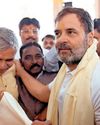
India is a maritime nation’ is an oft-heard phrase, strategically inserted into speeches of senior politicians and government functionaries. It has a nice ring to it. People believe what they say because of the exalted stature of the speakers. Besides, it sounds quite self-glorifying. This belief, however, is not necessarily because we understand what it means to be a maritime nation.
Geographically, India is a maritime nation. There was never a doubt about it. Very few countries in the world have oceans on three sides. No other country in the world has an ocean named after it. India’s maritime and seafaring tradition dates back to 3,000 BCE when the Indus Valley civilisation was known to have maritime trade with Mesopotamia.
Geography has time and again shaped the history of nations. Rivers and seas have been critical elements of such civilisational histories, be it the early Egyptian civilisation along the banks of the Nile or our very own Indus Valley. Two-thirds of civilisations live within 200 miles from coasts. It is also an undeniable fact of history that invaders who came to India across the land borders either went back or were assimilated, but the colonisers who came to India from the sea enslaved, plundered and looted the Indian people for over three centuries.
Does India possess a maritime mindset? The answer is a big ‘no.’ It was a bigger ‘no’ till even a few years ago. It has been a recent realisation that India has to look towards the sea not just to counter maritime adversaries, but also for its economic well-being. This is what we term as the ‘Blue Economy’. We are ‘Blue’ in word, but not in thought and deed. Here is why.
DEFENCE
هذه القصة مأخوذة من طبعة December 31, 2023 من THE WEEK India.
ابدأ النسخة التجريبية المجانية من Magzter GOLD لمدة 7 أيام للوصول إلى آلاف القصص المتميزة المنسقة وأكثر من 9,000 مجلة وصحيفة.
بالفعل مشترك ? تسجيل الدخول
هذه القصة مأخوذة من طبعة December 31, 2023 من THE WEEK India.
ابدأ النسخة التجريبية المجانية من Magzter GOLD لمدة 7 أيام للوصول إلى آلاف القصص المتميزة المنسقة وأكثر من 9,000 مجلة وصحيفة.
بالفعل مشترك? تسجيل الدخول

Use multi-asset investing to overcome portfolio volatility
EQUITY MARKETS have been choppy during this year. After rallying for the better part of the first nine months of 2024, equities corrected sharply in October and November, before taking off once again on rally mode in December.

Twist of faith
Upamanyu Chatterjee is back with his wry sense of humour in his new novel, and most of it is directed at religion and spirituality

THE GLORY OF SARI
Saris of Memory weaves together history and textiles, highlighting key moments from the author's collection

We win together
We invented chess, which was pretty cool of us. The original game 'chaturanga'that is four divisions (infantry, cavalry, elephantry and chariotry)-was a war strategy game. When the game travelled to the Middle East, they mangled the Sanskrit and it ended up being called 'shatranj' instead.

BEATS THAT HEAL
Music ignites the light within us, says Grammy-winner Chandrika Tandon

Older, smarter, sexier
Those who worship him regardless of where he works have continued to do so. Such is the power of Alessandro Michele, that after being the face of some mega brands for 10 years (namely Gucci and now Valentino), he remains bigger than the labels themselves. His debut collection for Valentino was presented at the recent Paris Haute Couture Week, and it has been adored by his adorers.

The road to peace
Future political dialogues should explore means of ensuring a more robust autonomy to tribal communities

Diary of a Sherpa
Amitabh Kant's new book is a comprehensive account of the G20 Summit held in Delhi in 2023

The annoying orange
Everything is great. All is sunshine. I am an eternal optimist.\" It's the fad of our TikTok times everything is not great, the sun sets daily, nothing is eternal. If anything, everything is ephemeral, night brings darkness, and optimism often crumbles under the weight of history. British philosopher Roger Scruton warned: \"Hope untempered by the evidence of history is a dangerous asset, one that threatens not only those who embrace it, but all those within range of their illusions.\"

NO SEAT, YET UPBEAT
The Congress is buoyed by its increased vote share in Delhi, and feels it can push the AAP into further decline